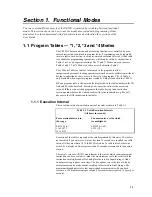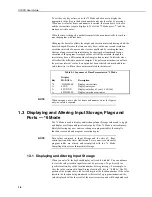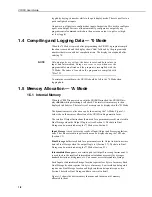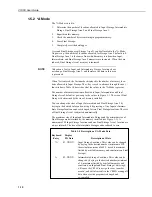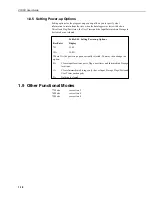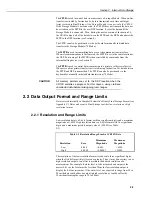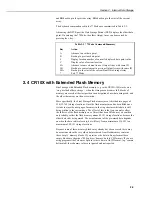
Section 1. Functional Modes
1-9
Figure 1-1 Memory Allocation in the CR10X
System Memory
(4096 Bytes)
Active Program
(default 2048 bytes)
Input Storage
(default 28 locations,
112 bytes)
Intermediate
Storage
(default 64
locations, 256 bytes)
Final Storage Area 1
(default 62,280
locations, 124,560
bytes)
Final Storage Area 2
(default 0 locations,
0 bytes)
Operating System
(96 Kbytes)
Active Program
(16 Kbytes)
Stored Programs
(16 Kbytes)
Final Storage Area 1
and/or
Final Storage Area 2
(Additional 524,288
locations per Mbyte)
How it works:
The
Operating System
is loaded into
Flash Memory at the factory.
System
Memory
is used while the CR10X is
running calculations, buffering data and
for general operating tasks.
Any time a user loads a program into
the CR10X, the program is compiled in
SRAM and stored in the
Active
Program
areas. If the CR10X is
powered off and then on, the Active
Program is loaded from Flash and run.
The Active Program is run in SRAM to
maximise speed. The program accesses
Input Storage
and
Intermediate
Storage
and stores data into
Final
Storage
for later retrieval by the user.
The Active Program can be copied into
the
Stored Programs
area. While 98
program ‘names’ are available, the
number of programs stored is limited
by the available memory. Stored
programs can be retrieved to become
the active program. While programs are
stored one at a time, all stored
programs must be erased at once. That
is because the flash memory can only
be written to once before it must be
erased and can only be erased in 16
Kilobyte blocks.
With the Optional Flash Memory, up to
2 Mbytes of additional memory can be
added to increase Final Storage by
another 524,288 data values per Mbyte.
The user can allocate this extra memory
to any combination of Area 1 or Area
2. Also see Section 1.5 of this manual.
(Memory Areas separated by dashed
lines:
can be re-sized by the user.)
Flash Memory
(EEPROM)
Total 128K bytes
SRAM
Total 128K bytes
Optional
Flash EEPROM







